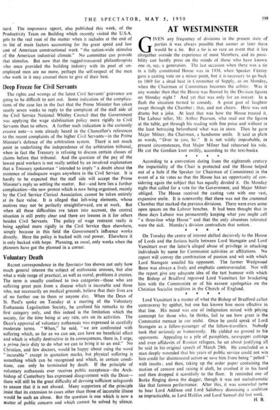Voluntary Death
Recent correspondence in the Spectator has shown not only how much general interest the subject of euthanasia arouses, but also what a wide range of practical, as well as moral, problems it creates. The term is usually confined to two categories—those who are suffering great pain from a disease which is incurable and those who, not necessarily on medical grounds, believe that their lives are of no further use to them or anyone else. When the Dean of St. Paul's spoke on Tuesday at a meeting of the Voluntary Euthanasia Legalisation Society, he confined his remarks to the first category only, and this indeed is the limitation which the society, for the time being at any rate, sets on its activities. The Dean's approval of voluntary euthanasia was expressed in carefully moderate terms. " When," he said, we are confronted with suffering which, so far as we can see, can have no beneficial effect and which is wh9lly destructive in its consequences, there is, I urge, a prima fade duty to do what we can to bring it to an end." No Christian, and few doctors, would be happy about using the word " incurable " except in quotation marks, but physical suffering is something which can be recognised and which, in certain condi- tions, can only be terminated by death. If the principle of voluntary euthanasia ever receives public acceptance—the Arch- bishop of Canterbury has expressed disagreement with the Dean— there will still be the great difficulty of devising sufficient safeguards to ensure that it is not abused. Many supporters of the principle insist that its extension to cases other than those of incurable illness would be such an abuse. But the question is one which is now a 'natter of public concern and which cannot be solved by silence.






































 Previous page
Previous page